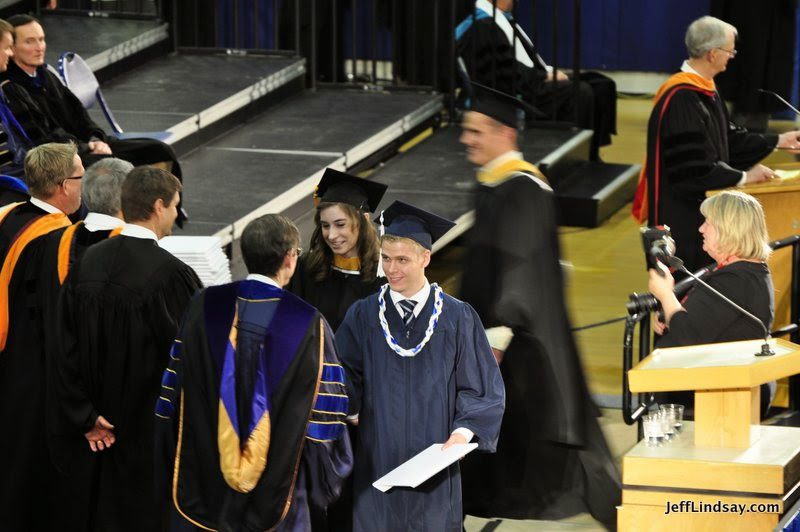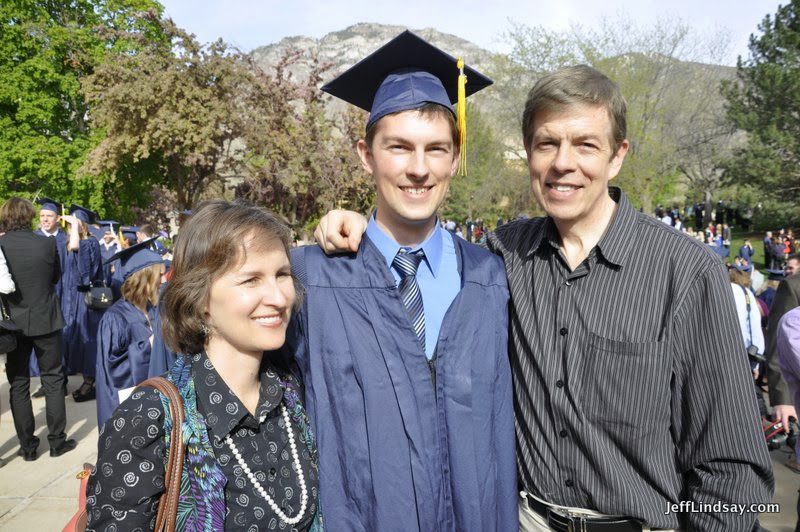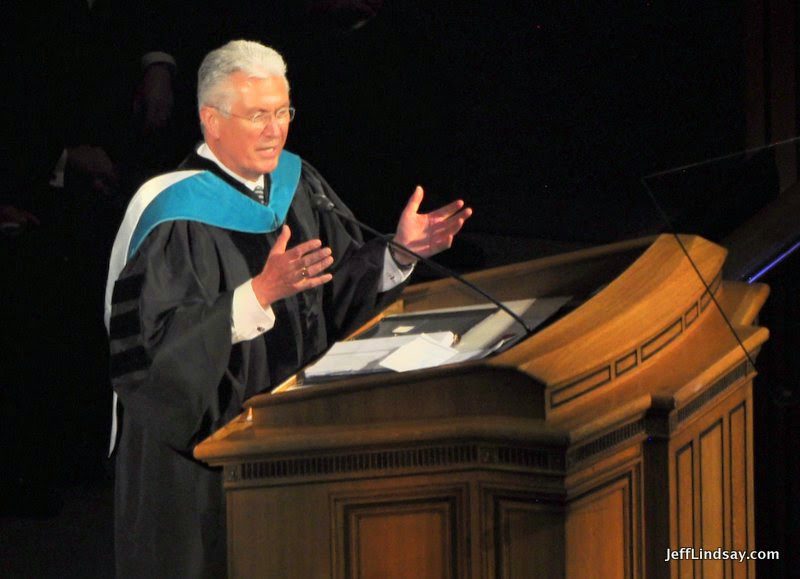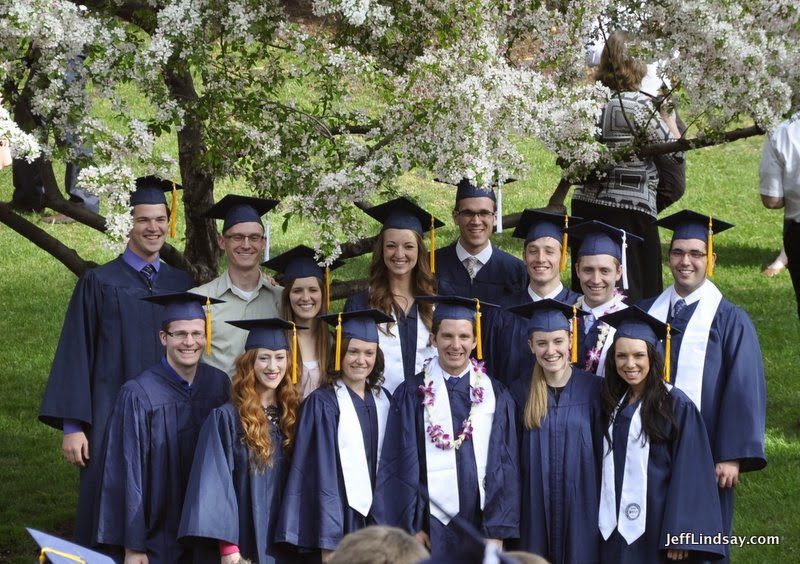I was in Utah recently to attend graduation ceremonies at Brigham Young University, where one of my sons was among the many graduates. The main convocation was outstanding and included remarks from President Dieter F. Uchtdorf, who looks surprisingly good in robes. Not any ordinary robes, but the special robes of college graduation, or, as Dr. Hugh Nibley so boldly put it when he was asked (first and last time) to give the opening prayer at a BYU commencement ceremony, “the black robes of a false priesthood.”
My son and I share a lack of appreciation of all the formality of graduation ceremonies, and both of us would probably have been happy to skip those formal events and do something fun instead. Yet there is value in these ceremonies. They can serve to strengthen our ties to the university. They help us focus on the significance of the education received. They help us recognize the value of the educational gifts received and honors won. They turn us to the promises of the future and sometimes can give us meaningful lessons to ponder in future years. The rites and pageantry can serve as a milestone for a significant transition and in my opinion, they were worth attending after all. I can see why the authorities of the University would value them and offer them for all who graduate. I can see why they are important to many parents such as my wife (and even I am starting to appreciate their value).
In a discussion a couple of days after graduation, a BYU alumnus raised a fair objection to the LDS temple concept: “It doesn’t make sense that God would require handshakes and keywords for people to get to heaven.” While the LDS Temple is filled with symbolism and various specific details used in presenting information in the ceremony known as the Endowment, much of which can be considered fluid and changeable, there is a core to the Endowment that does include some specific signs, tokens, and keywords, as mentioned in a statement from President Brigham Young about the LDS temple:
Your endowment is, to receive all those ordinances in the House of the Lord, which are necessary for you, after you have departed this life, to enable you to walk back to the presence of the Father, passing the angels who stand as sentinels, being enabled to give them the key words, the signs and tokens, pertaining to the Holy Priesthood, and gain your eternal exaltation in spite of earth and hell. (Journal of Discourses 2.31; cf. Journal of Discourses 1.278; 8.106; History of the Church 7.240)
Perhaps “being enabled” with key words, etc., could be symbolic and might simply refer to keeping covenants to follow Christ, with no real need to use Temple information after this life. Yet to many Latter-day Saints, Brigham Young’s statement sounds like more than just symbolism to teach us about covenants, but seems to suggest that the details given in the Temple for passing through the veil and entering into the Lord’s presence will be literally used after the Resurrection to enter into presence of God. Whoa, really? Naturally, it’s easy to say that it doesn’t make sense. Why on earth would there be anything of that nature to get into heaven? Definitely a fair question.
The many formalities of the Temple are foreign to us. Participating in temple ceremonies while dressed in white temple robes is something very strange for most of us in the modern era. Having a formal ceremony with detailed procedures looking forward to the time of entering the Lord’s presence is naturally quite outside our normal experiences in the world. But is it really unreasonable or out of the question?
 |
| Students receiving degrees in the College of Engineering at BYU. |
The BYU alumnus who raised the objection once passed through a graduation ceremony at BYU. He and his fellow graduates were dressed in robes and caps all of the same color. They participated in a formal ceremony that involved hearing instructions and, one by one, passing across a specific point on the stage, guided by authority figures, where they received their degree from an authority figure with a handshake. There may be some superficial similarities to some parts of the LDS Endowment.
So here’s my question in response to the objection raised: Is it utterly unreasonable that our Heavenly Father would choose to mark our future graduation from transition into Eternal Life with a graduation ceremony of some kind? Could details of such a rite of passage or graduation that might seem formal and unnecessary to us have value and purpose in His eyes? The Lord, after all, does seem to be rather keen on symbolism and ritual in teaching us and guiding is. He’s been that way since the beginning. Why should such things be limited to mortality alone?
As we understand from revelation, mortality is an educational journey. Through the power of Jesus Christ and His Atonement, our education here can be filled with meaning and eternal purpose as we make and keep covenants with Him, receiving His grace and further knowledge and power from Him. Ultimately we graduate from this life, rise with the grace of the Resurrection, and can receive our “degree” in one of the “degrees of glory,” hopefully the Celestial Kingdom where we enter into the presence of God forever. Will such a grand and overwhelming transition occur in a casual manner? “Hi, you’re in heaven. Come on in?” Or will there be some symbolism and pageantry to further teach us, guide us, and cement our relationship to the Source of our blessings, the Giver of our degree, and the Master Educator who taught us and blessed us over so many years at such great expense? Could there be an actual physical transition similar to passing through the veil, accompanied with symbols and formal words representing our graduation from mortality and entry into life eternal?
I don’t know. But I think it would be unwise to dismiss the symbols and other details of the Temple as something that God couldn’t possibly care about or employ in some fashion for our future graduation into His presence. Symbolism and ritual have been part of His ways forever, and may be an important part of the new beginnings we will experience as we graduate into His presence one grand day in the future. I hope you’ll all be there and not choose to run off somewhere else that day.
Related information: LDSFAQ page on the LDS Temple (and allegations of Masonic origins).












The Masonic connection is best described by one who is both a Mason and Temple attending Morman.
Joseph did not have a lot of experience as a Mason. As I understand he was simply honored with his 3rd degree Masonic appointment on sight. He did not have to go through the steps most men went through.
Questions now arise what participation, if any, Masonry played Joseph's assassination, and attempted protection in the Carthage jail.
In the Pistis Sophia there is a certain term used that Brigham Young used. I have never seen that terminology any where else. The Pistis Sophia was not known in BYs day.
Pistes Sophia and Books of Jeu have symbolisms similar to our modern Temples. It is uncanny.
Yes it is important to know these things. We see everything with our modern thinking. In ancient times symbolism was very important and we have lost that. The Scriptures are full of symbolism as is the Temple. Which is why the majority of Christianity does not interpret the Bible correctly and why LDS members do not understand the Temple and why critics mock the LDS beliefs.
Still Learning
When I was teen in 1970/1980 the church leaders said not to join secret clubs and they specifically mentioned Masons and Eastern Star and others like them.
Why do the leaders not say anything today about not joining these organizations? It seems there are a lot of LDS in Masons today.
Thanks if anyone knows
It is interesting to note that coronation ceremonies of kings/queens especially England, has a lot of symbolism, and it has similarities to the LDS Temple rituals. Watch the coronation of Queen Elizabeth II, and her coronation was the first one that the subjects were allowed to witness. New age of television.
Look up where the coronation ceremony came from and why. Interesting.
Joseph's father and brother Hyrum were Masons. After the LDS moved West, for a period of time LDS men were not allowed to be Masons. It is now okay for LDS men to be a Mason. Many LDS say there is no connection between the ceremonies. There are things conscientious LDS Temple goers excuse themselves from in the Masonic Temple.
The Temple has always fascinated me since my first awkward attendance. Will we go through the motions as a graduate in the next life? I don't know. Doesn't really matter because the temple is very explicit as to what the symbolism (for most things) stands for. They are physical representations of laws and commandments we covenant to live.The best analogy is saluting the flag that does us no good if we don't respect the ideals of the country it stands for.
The reason that Mormons were counseled not to join the Masons and like organizations is historical. Joseph Smith sought association with the larger world through the Masons in hopes non-religious bonds of fellowship could be made — learning valuable lessons about the temple along the way. That turned out disastrous as Masons accused Mormons of abusing the system and Mormons accused Masons of helping to orchestrate the assassination of Joseph Smith when the ideals should have protected him and them. Over the years such feelings have dissipated as Masons became more secular and Mormons assimilated. Today the Masons are seen as a footnote to Mormons and Masons have (thankfully?) forgotten its historical rivalry with the Mormons.
Jeff, you look like you've lost a lot of weight in that picture, compared to previous pics.